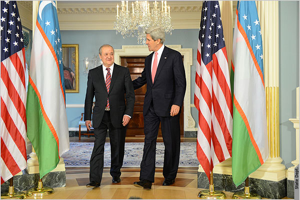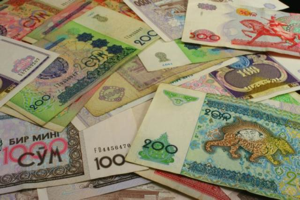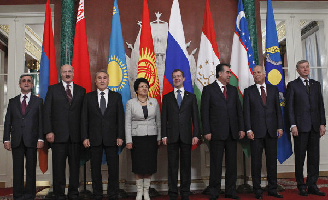CACI Analyst, May 29, 2013
Will The U.S. And Uzbekistan Revisit Their Strategic Partnership
by Farkhod Tolipov (03/20/2013 issue of the CACI Analyst)
On March 12, 2002, the U.S. and Uzbekistan signed a Declaration on Strategic Partnership and Cooperation Framework. The USUSP (U.S.-Uzbekistan Strategic Partnership) came about in the context of 9/11 and the launch of Operation Enduring Freedom in Afghanistan. In the eleven years that have passed since the establishment of these bilateral relations, the relationship has seen several ups and downs, testing the commitment of both sides to the letter and spirit of the Declaration. On March 12, 2013, Uzbekistan’s Foreign Minister visited Washington and met with the new U.S. Secretary of State. What are the prospects for reestablishing the strategic partnership?

Uzbekistan's Ban On Sale Of Foreign Banknotes Signals Upcoming Devaluation Of Uzbek Currency
by Nargiza Majidova (03/06/2013 issue of the CACI Analyst)
Starting from February 1, 2013, a ban on purchasing cash in foreign currency was introduced in Uzbekistan. From now on foreign currency banknotes can be obtained only through non-cash operations as a prepayment order on the bank account. On February 4, regional mass media reported that Uzbekistan’s government was ordered to reduce the quantity of imported goods, and to substitute these with locally produced ones. These currency regulations of Uzbekistan’s National Bank could signal an upcoming devaluation of Uzbekistan’s currency. An alternative interpretation is that the measure aims to preserve Uzbekistan’s hard currency reserves and to protect the business interest of local entrepreneurs.

CACI Analyst, February 20, 2013
Uzbekistan Without The CSTO
by Farkhod Tolipov (02/20/2013 issue of the CACI Analyst)
On December 19, 2012, the summit of the Collective Security Treaty Organization adopted a decision according to which Uzbekistan de facto completely ceased its membership in this organization. It seems that such a decision is to the mutual disadvantage of both Uzbekistan and the CSTO. Uzbekistan lost one important, albeit weak, multilateral platform for international engagement; the CSTO lost one important, albeit stubborn, member. The strategic and geopolitical situation in Central Asia became even more uncertain than has so far been the case. Uzbekistan’s bilateralism cannot be a panacea in face of security challenges, while the CSTO’s multilateralism, in turn, cannot be efficient in the region without Uzbekistan.






